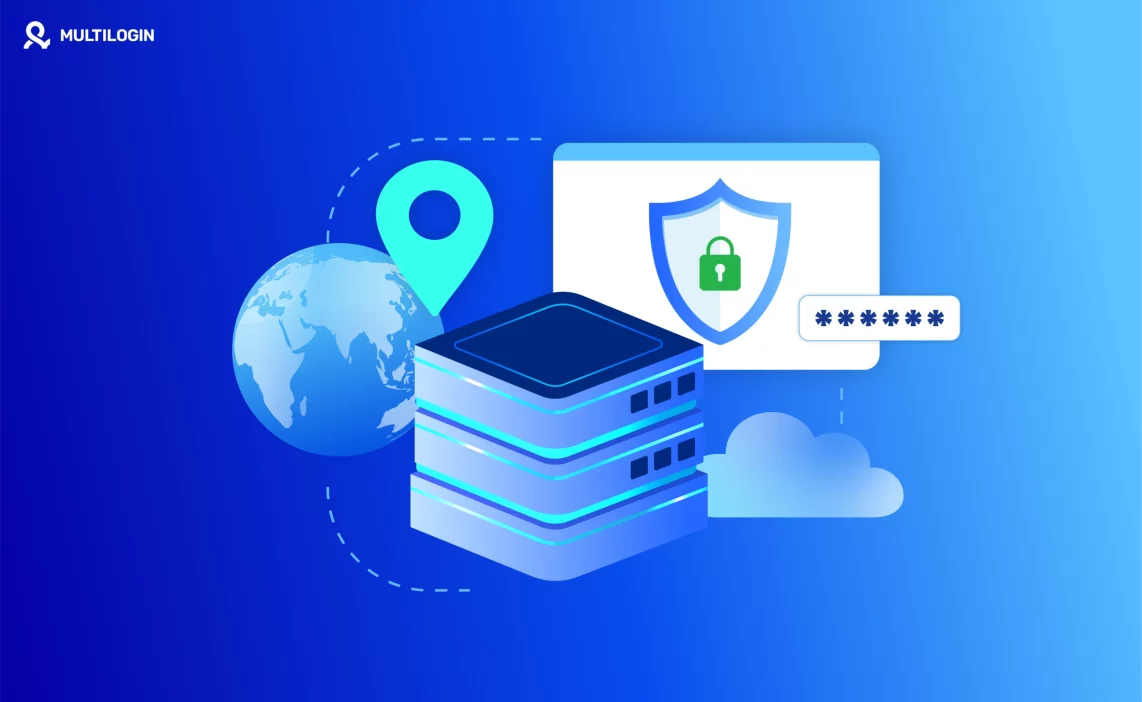Curious how Multilogin compares with Undetectable.io? See the differences and choose the best fit!
If you’ve ever wondered, “What is a proxy?” or “Why use a proxy if a firewall is already in place?”—you’re not alone! Understanding proxies can be a bit tricky at first, but once you get the hang of it, you’ll see how useful they can be for privacy, security, and internet functionality.
In this guide, we’ll explain what a proxy is, how it works, and why it’s essential for protecting your online activities. From web proxies to internet proxies, let’s break it down.
What is a Proxy?
A proxy is an intermediary server that sits between your device (like a computer or smartphone) and the internet. When you use a proxy, your internet traffic is rerouted through this intermediary server before reaching its final destination. It’s like having a middleman in a conversation—you communicate through them, and they send the information to the other party.
What Does a Proxy Do?
A proxy serves several important functions:
- Anonymity: A proxy can hide your real IP address, making your online actions harder to trace. This adds a layer of privacy for individuals and businesses alike.
- Security: It can act as a shield to protect your network from malware, hacking attempts, and other security threats by filtering out potentially dangerous websites or content.
- Content Filtering: In organizational environments (like schools or offices), proxies are often used to control access to certain websites, blocking content deemed inappropriate.
- Access Control: Proxies can also be used to manage which users can access certain content, such as restricting access to specific IP addresses or websites.
When you send a request to access a website, your request is first sent to the proxy server, which then forwards it to the website. The website responds to the proxy, which then relays the information back to you.
💡 Proxy Definition: Essentially, a proxy acts as a gateway that forwards requests from your device to the internet. This helps obscure your real location, IP address, and other private information.
What is Internet Proxy?
An internet proxy refers to any proxy server that connects you to the internet. It works just like any other proxy server but focuses specifically on internet access. This type of proxy is commonly used to maintain privacy, protect users from cyber threats, and allow access to restricted content based on location.
For example, internet proxies can allow users to bypass geographic restrictions on streaming services or access websites that are blocked in certain regions.
What is a Web Proxy?
A web proxy is a specialized type of proxy server used primarily for browsing websites. Instead of configuring a proxy in your browser or operating system, you can use a web proxy through a website. You visit the proxy site, enter the URL you want to access, and the web proxy fetches the site for you, masking your real IP address in the process.
This is particularly useful for users who want to access websites anonymously without installing proxy settings on their device. Popular examples of web proxies include websites like Rayobyte Proxies or Webshare Proxies.
Why Use a Proxy if a Firewall is Better?
A firewall and a proxy may sound similar, but they serve different purposes. A firewall is designed to filter and monitor incoming and outgoing network traffic based on security rules, essentially acting as a barrier to protect against unauthorized access.
Here’s why a proxy can still be useful, even if you have a firewall:
- Privacy: While a firewall focuses on security, a proxy focuses on anonymity. It can mask your IP address, which a firewall does not do.
- Geo-Spoofing: Proxies allow you to change your IP address to a different location, enabling access to content that might be restricted in your region. Firewalls do not offer this feature.
- Control Access: Proxies allow businesses or network administrators to filter and control internet access based on user behavior or location, which a firewall cannot do in the same way.
Types of Proxies
There are different types of proxies designed to serve various purposes. Here are some of the most common ones:
- HTTP Proxy: Primarily used for browsing the web. It only works with web traffic.
- HTTPS Proxy: A secure version of the HTTP proxy. It encrypts the data you send and receive, offering a higher level of security.
- SOCKS Proxy: This type of proxy can handle any type of traffic (not just HTTP or HTTPS) and is useful for tasks like torrenting, gaming, or bypassing firewalls.
- Residential Proxy: These proxies use real IP addresses assigned to physical locations. They are more difficult to detect than data center proxies.
- Data Center Proxy: These proxies are from data centers and are typically faster but easier to detect as they are not associated with real residential addresses.
How Does a Proxy Work?
The basic workflow for using a proxy looks like this:
- You send a request to access a website or online service.
- Instead of connecting directly to the website, your request goes through the proxy server.
- The proxy server forwards your request to the destination website.
- The website responds to the proxy server, which then sends the data back to you.
In this setup, the website only sees the proxy’s IP address, not your real IP address, providing you with anonymity.
Manage multiple accounts securely in New York with Multilogin’s New York Proxy & Antidetect Browser.
Why Use a Proxy?
There are several reasons to use a proxy server. Here are some common use cases:
- Improved Privacy: Proxies help anonymize your web activity, making it harder for websites and online services to track you.
- Access Restricted Content: Proxies allow you to bypass geographic restrictions and access content from anywhere.
- Bypass Network Blocks: In restricted networks (such as schools or workplaces), proxies can help you bypass content filters and firewalls.
- Enhanced Security: Proxies can protect against cyber threats by filtering out malicious websites and acting as an additional barrier against online attacks.
- Web Scraping: For activities like scraping data from websites, proxies allow you to mask your identity and avoid getting blocked by the site.
Frequently Asked Questions About Proxies
What is a proxy used for?
A proxy is used to route internet traffic through an intermediary server. It can improve privacy, provide security, bypass restrictions, and manage access to websites or online content.
What does a proxy do?
A proxy acts as an intermediary server between you and the internet. It helps hide your real IP address, secures your online activity, and gives you control over which content you can access.
What is the difference between a proxy and a VPN?
Both a proxy and a VPN hide your IP address and mask your online activities. However, a VPN provides a higher level of security and privacy by encrypting all your internet traffic, whereas a proxy generally only hides your IP address without encryption.
What is a web proxy?
A web proxy is a type of proxy that works through a website. You enter the URL you want to visit on the proxy website, and it fetches the website’s content for you, hiding your IP address in the process.
What is a residential proxy?
A residential proxy is a proxy that uses real IP addresses assigned to residential locations. It’s harder for websites to detect and block, making it more effective for tasks like web scraping.
Final Thoughts
In summary, a proxy is a versatile tool that can enhance your online privacy, security, and access control. Whether you need to bypass geographic restrictions, scrape data, or simply protect your identity, a proxy can help you achieve your goals.
Understanding how proxies work and why they’re useful will help you make smarter decisions when it comes to online security and privacy.
Remember, proxies aren’t just for hiding your identity—they’re a great way to control your internet experience, enhance security, and maintain anonymity online.




